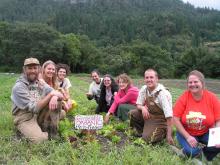Farm to School /Institution
Theme
Practice
Global trade, refrigeration as well as canned and dried goods has increased the availability of items. Cooks working at schools, nursing homes and jails typically can prepare menus with the expectation that most fruits and vegetables they desire can be purchased all year long. Unfortunately the increased choices do not necessarily increase nutritional value.
So, it is important that more farmers have direct connections with schools and institutions located within their communities to increase access to locally produced vegetables and fruits. A broker helps to stimulate that relationship by determining what the farmer can produce as well as what the institution usually procures from wholesalers.
While the growing season in each region is the greatest limiting factor to directly serving schools and instititions, many farmers have augmented their own capacity using a number of means. Some have added greenhouses and hydroponics while others have focused on value added products that are either dried, milled or canned.
Contradictions
When the growing season is short, trucks from wholesalers travel out of a region to procure goods in large full season markets. Unforunately, their trucks often leave empy.
It is not easy for small acreage farmers to compete with industrial agriculture's use of heavy fertilizers and pest control.
Opportunities
